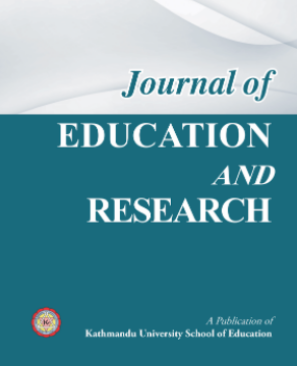
Informal Skills Learning: A Case Study of Small-Sized Enterprises in Nepal
PhD Thesis Abstract
Journal of Education and Research, Volume 14, Issue 1, 2024, 125-126, https://doi.org/10.51474/jer/16198
Publication date: Mar 27, 2024
Views: 540 | Downloads: 203
How to cite this article
APA
In-text citation: (Baral, 2024)
Reference: Baral, D. P. (2024). Informal Skills Learning: A Case Study of Small-Sized Enterprises in Nepal. Journal of Education and Research, 14(1), 125-126. https://doi.org/10.51474/jer/16198
Reference: Baral, D. P. (2024). Informal Skills Learning: A Case Study of Small-Sized Enterprises in Nepal. Journal of Education and Research, 14(1), 125-126. https://doi.org/10.51474/jer/16198
Vancouver
In-text citation: (1), (2), (3), etc.
Reference: Baral DP. Informal Skills Learning: A Case Study of Small-Sized Enterprises in Nepal. Journal of Education and Research. 2024;14(1):125-6. https://doi.org/10.51474/jer/16198
Reference: Baral DP. Informal Skills Learning: A Case Study of Small-Sized Enterprises in Nepal. Journal of Education and Research. 2024;14(1):125-6. https://doi.org/10.51474/jer/16198
AMA
In-text citation: (1), (2), (3), etc.
Reference: Baral DP. Informal Skills Learning: A Case Study of Small-Sized Enterprises in Nepal. Journal of Education and Research. 2024;14(1), 125-126. https://doi.org/10.51474/jer/16198
Reference: Baral DP. Informal Skills Learning: A Case Study of Small-Sized Enterprises in Nepal. Journal of Education and Research. 2024;14(1), 125-126. https://doi.org/10.51474/jer/16198
Chicago
In-text citation: (Baral, 2024)
Reference: Baral, Durga Prasad. "Informal Skills Learning: A Case Study of Small-Sized Enterprises in Nepal". Journal of Education and Research 2024 14 no. 1 (2024): 125-126. https://doi.org/10.51474/jer/16198
Reference: Baral, Durga Prasad. "Informal Skills Learning: A Case Study of Small-Sized Enterprises in Nepal". Journal of Education and Research 2024 14 no. 1 (2024): 125-126. https://doi.org/10.51474/jer/16198
Harvard
In-text citation: (Baral, 2024)
Reference: Baral, D. P. (2024). Informal Skills Learning: A Case Study of Small-Sized Enterprises in Nepal. Journal of Education and Research, 14(1), pp. 125-126. https://doi.org/10.51474/jer/16198
Reference: Baral, D. P. (2024). Informal Skills Learning: A Case Study of Small-Sized Enterprises in Nepal. Journal of Education and Research, 14(1), pp. 125-126. https://doi.org/10.51474/jer/16198
MLA
In-text citation: (Baral, 2024)
Reference: Baral, Durga Prasad "Informal Skills Learning: A Case Study of Small-Sized Enterprises in Nepal". Journal of Education and Research, vol. 14, no. 1, 2024, pp. 125-126. https://doi.org/10.51474/jer/16198
Reference: Baral, Durga Prasad "Informal Skills Learning: A Case Study of Small-Sized Enterprises in Nepal". Journal of Education and Research, vol. 14, no. 1, 2024, pp. 125-126. https://doi.org/10.51474/jer/16198
ABSTRACT
In the context of underdeveloped countries, where the informal economy prevails, dimensions of informal skills learners—workers with relatively low educational qualifications and working in informal work-settings—are enormous in the total national employment. However, this is a scantly researched area. This qualitative case study explores how such learners learn and develop skills and progress in their occupational life in Nepal. The study explores the following questions: 1) How do informal skills learners acquire their skills? 2) How do informal skills learners experience the drivers and barriers in skills learning? and 3) How do informal skills learners develop occupational skills at the workplace?
Following Robert Yin’s qualitative case study approach, I designed the research. I observed small-sized enterprises of four different occupations—pottery, metalcraft, two-wheeler mechanics, and fast food—located in the Kathmandu Valley of Nepal. The study had 17 informal skills learners from those occupations as the research participants. I interpreted the information obtained from the field based on learning theories, particularly the workplace learning theory of Knud Illeris.
The study concluded that the primary process of skills learning is the herne/sunne-sochne-garne-saparne [see/listen-think-do-improve], but not as a linear process that relies on some specific skills learning approaches. The study explored that informal skills learners use mainly two learning approaches. The first is reflection and action, including observation, memorization, imitation, and performing trial and error. The second is social interaction, including feedback. The research also found that informal skills learners face multiple drivers and barriers to skills learning, mainly related to the organization or their personal characteristics and situation.
Overall, the study concluded that informal skills learning is a gradual process of skills development and occupational progression that passes through different learning phases—entry or orienting, skilling, improving, and mastering. Finally, the study presents a dynamic model of informal skills learning and development as a primary knowledge contribution of the research.
Following Robert Yin’s qualitative case study approach, I designed the research. I observed small-sized enterprises of four different occupations—pottery, metalcraft, two-wheeler mechanics, and fast food—located in the Kathmandu Valley of Nepal. The study had 17 informal skills learners from those occupations as the research participants. I interpreted the information obtained from the field based on learning theories, particularly the workplace learning theory of Knud Illeris.
The study concluded that the primary process of skills learning is the herne/sunne-sochne-garne-saparne [see/listen-think-do-improve], but not as a linear process that relies on some specific skills learning approaches. The study explored that informal skills learners use mainly two learning approaches. The first is reflection and action, including observation, memorization, imitation, and performing trial and error. The second is social interaction, including feedback. The research also found that informal skills learners face multiple drivers and barriers to skills learning, mainly related to the organization or their personal characteristics and situation.
Overall, the study concluded that informal skills learning is a gradual process of skills development and occupational progression that passes through different learning phases—entry or orienting, skilling, improving, and mastering. Finally, the study presents a dynamic model of informal skills learning and development as a primary knowledge contribution of the research.
REFERENCES
---
LICENSE
This work is licensed under a Creative Commons Attribution-ShareAlike 4.0 International License.
